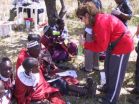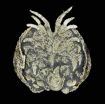(Press-News.org) Most people lose the ability to digest the milk sugar lactose after weaning, but some populations retain high levels of an enzyme called lactase, which allows them to break down lactose in adulthood. In a study published March 13th in the American Journal of Human Genetics, researchers identified genetic factors associated with lactase persistence in African populations and found that this trait became more prevalent in recent history in conjunction with the introduction and spread of cattle domestication in Africa. The findings provide strong evidence that lactase persistence evolved in human populations as a dietary adaptation.
"To date, there has never been a large-scale study of lactase persistence that included such a large set of geographically and ethnically diverse populations," says study author Sarah Tishkoff of the University of Pennsylvania. "Our study sheds light on both the genetic basis and evolutionary history of a biologically relevant trait in humans and the origins of pastoralism in Africa."
Individuals with northern European ancestry, as well as African, Arabian, and Central Asian pastoral populations with a tradition of fresh-milk production and consumption, retain high levels of lactase into adulthood. DNA sequence variations linked to lactase persistence have been identified in European populations, but until recently, little was known about genetic factors associated with this trait in African pastoral populations.
In the new study, Tishkoff, along with Alessia Ranciaro, also of the University of Pennsylvania, and collaborators around the globe sought to address this gap in knowledge. The researchers performed a large-scale sequencing analysis of all of the genomic regions thought to influence the activity of the lactase-encoding LCT gene in 819 individuals from 63 diverse African populations and in 154 non-Africans from nine different populations in Europe, the Middle East, and Central and East Asia. They identified several single-nucleotide variants—DNA sequence variations affecting a single nucleotide—associated with lactase persistence.
Moreover, their genetic analysis revealed strong evidence of recent positive selection affecting several variants associated with this trait in African populations, most likely in response to the cultural development of pastoralism. The origins of these variants coincided with the introduction of cattle domestication in Africa about 10,000 years ago and its subsequent spread through pastoral migrations.
INFORMATION:
Tishkoff will present an overview of genetic variation in Africa and discuss these findings as well as research about the genetic basis of complex traits, such as short stature in Pygmies, at the Cell Symposium "Evolution of Modern Humans: From Bones to Genomes," which will take place March 16-18 in Sitges, Spain. The symposium will bring together world-class researchers from a variety of fields, including genetics and anthropology, to discuss the current picture of the evolution of modern humans and formulate the most exciting questions for future research.
Humans' ability to digest milk stems from the advent of cattle domestication in Africa
Study published in advance of upcoming Cell Symposium on the Evolution of Modern Humans in Sitges, Spain Mar. 16-18
2014-03-13
ELSE PRESS RELEASES FROM THIS DATE:
A versatile mouse that can teach us about many diseases and drugs
2014-03-13
Scientists from the UK and Australia have created a mouse that expresses a fluorescing 'biosensor' in every cell of its body, allowing diseased cells and drugs to be tracked and evaluated in real time and in three dimensions.
This biosensor mimics the action of a target molecule, in this case a protein known as 'Rac', which drives cell movement in many types of cancer. Rac behaves like a switch, oscillating on the molecular level between two states – active or inactive.
When Rac is active, the biosensor picks up chemical cues and glows blue. When Rac is inactive the ...
Penn team links Africans' ability to digest milk to spread of cattle raising
2014-03-13
Babies are born with the ability to digest lactose, the sugar found in milk, but most humans lose this ability after infancy because of declining levels of the lactose-digesting enzyme lactase. People who maintain high levels of lactase reap the nutritive benefits of milk, however, offering a potential evolutionary advantage to lactase persistence, or what is commonly known as lactose tolerance.
A new study led by University of Pennsylvania researchers — constituting the largest investigation ever of lactase persistence in geographically diverse populations of Africans ...
Columbia researchers discover reversible mechanism that increases muscle elasticity
2014-03-13
NEW YORK, NY – How does yoga improve your flexibility? In the Mar 13 cover story of Cell, Columbia University biological sciences professor Julio Fernandez and team report the discovery of a new form of mechanical memory that adjusts the elasticity of muscles to their history of stretching. Using highly sensitive atomic force microscopes, the researchers detected a chemical reaction that increases the elasticity of muscle proteins. Crucially, this reaction targets molecules that have been exposed to a stretching force. This finding changes our understanding of how muscles ...
Researchers identify gene that helps fruit flies go to sleep
2014-03-13
In a series of experiments sparked by fruit flies that couldn't sleep, Johns Hopkins researchers say they have identified a mutant gene — dubbed "Wide Awake" — that sabotages how the biological clock sets the timing for sleep. The finding also led them to the protein made by a normal copy of the gene that promotes sleep early in the night and properly regulates sleep cycles.
Because genes and the proteins they code for are often highly conserved across species, the researchers suspect their discoveries — boosted by preliminary studies in mice — could lead to new treatments ...
Human brains 'hard-wired' to link what we see with what we do
2014-03-13
Your brain's ability to instantly link what you see with what you do is down to a dedicated information 'highway', suggests new UCL-led research.
For the first time, researchers from UCL (University College London) and Cambridge University have found evidence of a specialized mechanism for spatial self-awareness that combines visual cues with body motion.
Standard visual processing is prone to distractions, as it requires us to pay attention to objects of interest and filter out others. The new study has shown that our brains have separate 'hard-wired' systems to visually ...
New view of tumors' evolution
2014-03-13
CAMBRIDGE, MA -- Cancer cells undergo extensive genetic alterations as they grow and spread through the body. Some of these mutations, known as "drivers," help spur cells to grow out of control, while others ("passengers") are merely along for the ride.
MIT cancer biologists at the Koch Institute for Integrative Cancer Research and geneticists from the Broad Institute have now performed the most comprehensive analysis to date of these changes in mice programmed to develop cancer. The team discovered mutations and other genetic disturbances that arise at certain stages ...
Parental care of the young from 450 million years ago
2014-03-13
A portrait of prehistoric parenthood captured deep in the fossil record has been uncovered by an international team of scientists led by University of Leicester geologist Professor David Siveter.
The 'nursery in the sea' has revealed a species new to science – with specimens preserved incubating their eggs together with probable hatched individuals. As a result, the team has named the new species Luprisca incuba after Lucina, goddess of childbirth, and alluding to the fact that the fossils are ancient and in each case the mother was literally sitting on her eggs.
The ...
Fossil porpoise has a chin for the ages
2014-03-13
Scientists have identified a new species of ancient porpoise with a chin length unprecedented among known mammals and suggest the animal used the tip of its face to probe the seabed for food.
Related to living crown porpoises, the extinct Californian porpoise, Semirostrum ceruttii, had an extension of its jaw called a symphysis — the analogue of the human chin — that measured 85 centimeters in the best-preserved specimen, researchers said. The typical symphysis of a crown porpoise measures one or two centimeters.
"This is unique anatomy for a mammal," said Rachel Racicot, ...
Scientists catch brain damage in the act
2014-03-13
Scientists have uncovered how inflammation and lack of oxygen conspire to cause brain damage in conditions such as stroke and Alzheimer's disease.
The discovery, published today in Neuron, brings researchers a step closer to finding potential targets to treat neurodegenerative disorders.
Chronic inflammation and hypoxia, or oxygen deficiency, are hallmarks of several brain diseases, but little was known about how they contribute to symptoms such as memory loss.
The study used state-of-the-art techniques that reveal the movements of microglia, the brain's resident ...
Forgetting is actively regulated
2014-03-13
In order to function properly, the human brain requires the ability not only to store but also to forget: Through memory loss, unnecessary information is deleted and the nervous system retains its plasticity. A disruption of this process can lead to serious mental disorders. Basel scientists have now discovered a molecular mechanism that actively regulates the process of forgetting. The renowned scientific journal "Cell" has published their results.
The human brain is build in such a way, that only necessary information is stored permanently - the rest is forgotten over ...
LAST 30 PRESS RELEASES:
Novel camel antimicrobial peptides show promise against drug-resistant bacteria
Scientists discover why we know when to stop scratching an itch
A hidden reason inner ear cells die – and what it means for preventing hearing loss
Researchers discover how tuberculosis bacteria use a “stealth” mechanism to evade the immune system
New microscopy technique lets scientists see cells in unprecedented detail and color
Sometimes less is more: Scientists rethink how to pack medicine into tiny delivery capsules
Scientists build low-cost microscope to study living cells in zero gravity
The Biophysical Journal names Denis V. Titov the 2025 Paper of the Year-Early Career Investigator awardee
Scientists show how your body senses cold—and why menthol feels cool
Scientists deliver new molecule for getting DNA into cells
Study reveals insights about brain regions linked to OCD, informing potential treatments
Does ocean saltiness influence El Niño?
2026 Young Investigators: ONR celebrates new talent tackling warfighter challenges
Genetics help explain who gets the ‘telltale tingle’ from music, art and literature
Many Americans misunderstand medical aid in dying laws
Researchers publish landmark infectious disease study in ‘Science’
New NSF award supports innovative role-playing game approach to strengthening research security in academia
Kumar named to ACMA Emerging Leaders Program for 2026
AI language models could transform aquatic environmental risk assessment
New isotope tools reveal hidden pathways reshaping the global nitrogen cycle
Study reveals how antibiotic structure controls removal from water using biochar
Why chronic pain lasts longer in women: Immune cells offer clues
Toxic exposure creates epigenetic disease risk over 20 generations
More time spent on social media linked to steroid use intentions among boys and men
New study suggests a “kick it while it’s down” approach to cancer treatment could improve cure rates
Milken Institute, Ann Theodore Foundation launch new grant to support clinical trial for potential sarcoidosis treatment
New strategies boost effectiveness of CAR-NK therapy against cancer
Study: Adolescent cannabis use linked to doubling risk of psychotic and bipolar disorders
Invisible harms: drug-related deaths spike after hurricanes and tropical storms
Adolescent cannabis use and risk of psychotic, bipolar, depressive, and anxiety disorders
[Press-News.org] Humans' ability to digest milk stems from the advent of cattle domestication in AfricaStudy published in advance of upcoming Cell Symposium on the Evolution of Modern Humans in Sitges, Spain Mar. 16-18


